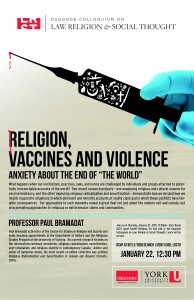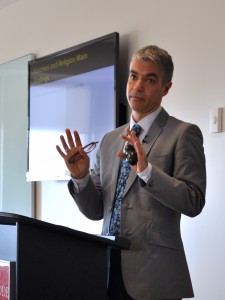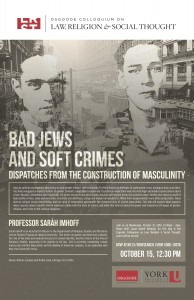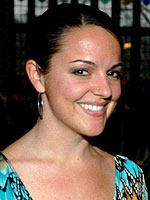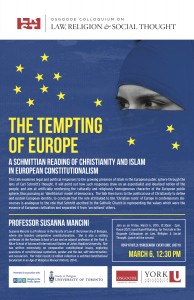 March 13, 2015
March 13, 2015
“The Tempting of Europe: a Schmittian Reading of Christianity and Islam in European Constitutionalism” Prof. Susanna Mancini (Università di Bologna)
12:00pm to 1:30pm
Department for the Study of Religion, University of Toronto
Jackman Humanities Building, Room 318, 170 St. George Street
This talk examines legal and political responses to the growing presence of Islam in the European public sphere through the lens of Carl Schmitt’s thought. It will point out how such responses draw on an essentialist and idealized notion of the people, and aim at artificially reinforcing the culturally and religiously homogeneous character of the European public sphere, thus pursuing an ‘identitarian’ model of democracy. The talk then turns to the political use of Christianity to define and sustain European identity, to conclude that the role attributed to the ‘Christian roots’ of Europe in contemporary discourses is analogous to the role that Schmitt ascribed to the Catholic Church in representing the values which were the essence of European civilization and separated it from ‘uncivilized’ others.
Susanna Mancini is a Professor in the Faculty of Law at the University of Bologna,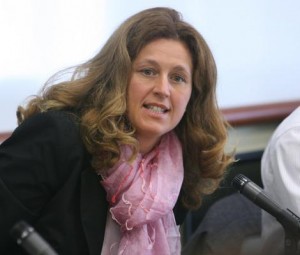 where she teaches comparative constitutionalism. She is also a visiting professor at the Fordham School of Law and an adjunct professor at the Paul H. Nitze School of Advanced International Studies of Johns Hopkins University. She has written extensively on comparative constitutional issues, exploring questions of constitutional symbolism, gender and the law, self-determination, and secularism. Her most recent co-edited collection is entitled Constitutional Secularism in an Age of Religious Revival (Oxford, 2014).
where she teaches comparative constitutionalism. She is also a visiting professor at the Fordham School of Law and an adjunct professor at the Paul H. Nitze School of Advanced International Studies of Johns Hopkins University. She has written extensively on comparative constitutional issues, exploring questions of constitutional symbolism, gender and the law, self-determination, and secularism. Her most recent co-edited collection is entitled Constitutional Secularism in an Age of Religious Revival (Oxford, 2014).
This talk is presented in association with the Religion in the Public Sphere Initiative, at the University of Toronto, Department for the Study of Religion.
Watch the lecture:
![RPS Master 01 2012-09-20 transparent background[1]](https://lrst.osgoode.yorku.ca/wp-content/uploads/2015/02/RPS-Master-01-2012-09-20-transparent-background1-300x218.jpg)


